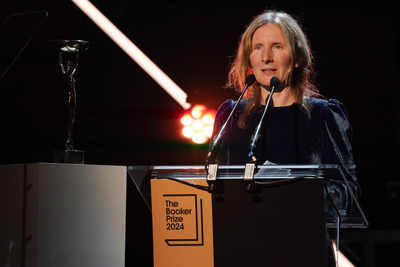Our lives here are inexpressibly trivial and momentous at once, it seems he’s about to wake up and say. Both repetitive and unprecedented. We matter greatly and not at all.”
Thus goes one of the lines in
Samantha Harvey
’s
Booker Prize
winning novel ‘Orbital’, a fictional story about six astronauts in the International Space Station (ISS) that is peppered with hope and wonder for our home planet, along with solemn takes on conflicts and human-led struggles for power. In a conversation with Jaya Bhattacharji Rose for the TOI Bookmark podcast, the British author spoke about the process of stringing together the prose, which almost appears to be an ode to life on earth.
“When you look at the Earth from low Earth orbit, you can’t see the entirety of the Earth. You can just see a flank of it. You can see the atmosphere and the stars… There seems to be a kind of tenderness somehow about the view of it from low Earth orbit. There’s a sense that this is our home, this is everything we have, that it’s real, and it’s something to be protected,” Harvey said.
The writer, who has previously been shortlisted for the James State Black Award, the Women’s Prize, the Guardian First Book Award, and the Walter Scott Prize, also highlighted the research that went into adding the visual details about Earth as seen by the astronauts. From following immersive ISS’ live transits of the Earth to pouring over images captured by lunar astronauts — all were key to building a fictional world that almost seems like a painting. Bringing together different aspects of science and engineering, including astronomy and physics, didn’t come easy, Harvey admitted, adding that she began to feel confident once the process of “alchemising” them all into prose began.
Was it disorienting to juggle these images, and then come back to the physical reality of her surroundings? In response to the question, Harvey highlighted the symbiotic link between the two. “You look at these images for hours and then you look out of your window at the garden and it’s a strange jolt of reality… it seems that the continents themselves are gardens,” she said. Interestingly, Harvey has no social media accounts, and has admitted in the past that she doesn’t own a mobile phone either.
Harvey, a student of philosophy, has often drawn from her the field to dwell upon questions about human existence — both big and small — in her fiction. Her debut novel, ‘The Wilderness’, is written from the point of view of a man struggling to hold on to his personal memories as Alzheimer’s takes over, while her second novel, ‘All Is Song’, deals with themes of moral and filial duty, and about the choice between questioning and conforming. ‘Orbital’, on the other hand, deals with themes of how miniscule human-made conflicts can appear in the larger scheme of things, albeit from a perspective that’s centred miles away. One of the discoveries that fascinated her the most, the author said, was the existence of a well-lit border between India and Pakistan, one of the few that can be sighted from space at night.
“During day time, you can’t see any borders at all, except natural borders of land and sea. But by night, the border between these two countries can be seen. Even then, the filigree of those lights is delicate and seems so harmless… That is the friendliness of the planet. It’s quite difficult to reconcile the knowledge of the conflict with the fact of what you’re seeing.”


